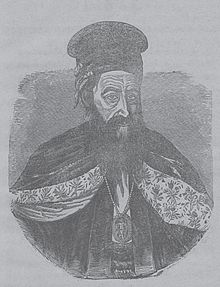Cyril VII of Constantinople
 From Wikipedia the free encyclopedia
From Wikipedia the free encyclopedia
You can help expand this article with text translated from the corresponding article in Greek. (June 2012) Click [show] for important translation instructions.
|
Cyril VII of Constantinople | |
|---|---|
| Ecumenical Patriarch of Constantinople | |
 | |
| Church | Church of Constantinople |
| In office | 3 October 1855 – 13 July 1860 |
| Predecessor | Anthimus VI of Constantinople |
| Successor | Joachim II of Constantinople |
| Personal details | |
| Born | 1775 |
| Died | 1872 |
Cyril VII (Greek: Κύριλλος; 1775–1872) was Ecumenical Patriarch of Constantinople from 1855 to 1860.[1][2][3]
His predecessor Anthimus VI was unpopular in the church and the Holy Synod formally petitioned the Ottoman government to depose him; the government agreed and choose the new Patriarch. As such, Cyril ascended the Ecumenical throne on October 2, 1855.[4]
He came to power during the Crimean War and witnessed the signing of Sultan Abdulmejid I’s Ottoman Reform Edict of 1856 which promised equality in education and justice to everyone, regardless of their religious beliefs.[5][6]
He was not a well-educated or an energetic person. Nonetheless, he did much for His Church and people. He did his best to raise funds for the victims of an earthquake in the diocese of Prusa. He issued instructions in the sphere of marriage and family life.
Due to the politics of the war, Cyril had a lot of enemies. He eventually resigned as Patriarch and spent the rest of his life in prayer and solitude in Halki.
He is buried at Hagia Triada Church in Istanbul.[7]
References
[edit]- ^ Hellenica World website
- ^ Christian History Institute website
- ^ Orthodox Council website
- ^ Orthodox History website, article dated February 1, 2022
- ^ Abu-Manneh, Butrus (1980). "The Christians between Ottomanism and Syrian Nationalism: The Ideas of Butrus Al-Bustani". International Journal of Middle East Studies. 11 (3): 287–304. doi:10.1017/S0020743800054647. JSTOR 162662.
- ^ Michigan State University, Modern Balkan History page
- ^ Adalarturizm website